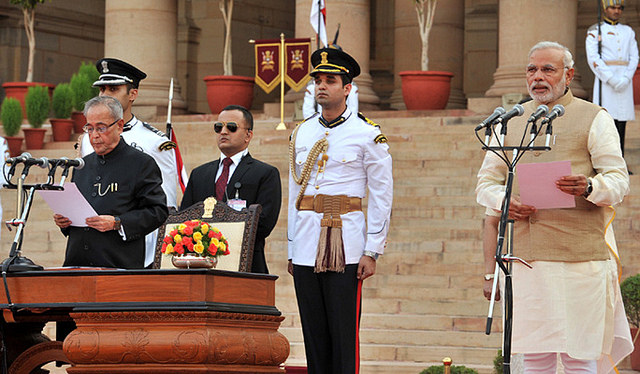Modi Assumes Office, Releases 10 Point Plan

The prime minister revealed Thursday his list of top 10 priorities for the government going forward, underscoring a need for a smoother decision-making process and the need to "build confidence in bureaucracy."
It was this tune of change to which Modi’s campaign platform swelled, of economic prosperity, national unity and globalization, winning him widespread popularity as the touted Indian equivalent of China’s Deng Xiaoping or America’s Ronald Reagan and leading to a landslide victory in the world’s largest election last month.
In the lower house of parliament, Modi’s Bharatiya Janata Party (BJP) has unseated the almighty Nehru-Gandhi legacy that has prevailed over national policy for the past 25 years, taking an absolute majority that will make it easier to govern a legislature that has been inherently fragmented by coalition, state and local politics.
He now carries the hopes of 1.2 billion Indians.
Despite his lack of federal experience, Modi has long been a high-profile public official, even prior to the election. The 2002 Hindu-Muslim bloody riots in his home state of Gujarat and his scathing remarks on the Congress Party brought the former chief minister particular infamy, while his working-class background as a young chaiwalla, or tea-seller, and hopeful rhetoric gained him affability and traction on the campaign trail. He is often considered “India’s most divisive politician,” the BBC reported as voters cast their ballots, “loved and loathed in equal measure.”
“Not since Indira Gandhi was assassinated in 1984 has India had such a powerful personality in charge,” said an editorial in The Economist.
A More Centralized Government
One of Modi’s first acts as prime minister was his announcement Sunday of an overhaul of the cabinet, which has moved to become a more streamlined and centralized model, and include the appointment of “super ministers” to oversee multiple committees.
Arun Jaitley, for example, a prominent corporate lawyer and political aide to Modi, has assumed the posts of both finance and defense minister, a decision that critics say neglects the importance of the two sectors.
"He is compent to handle 10 portfolios," Ravi Shankar Prasad, the minister of communication, IT, law and justice told reporters.
The change comes as Modi's directive pointed to a need for a system to deal with "inter-ministerial issues."
An Olive Branch to South Asia, Pakistan
Six other leaders from all across the South Asian region, such as the presidents of Afghanistan and the Maldives, were invited to attend Monday’s inauguration, as well as bilateral talks with Modi on his first day of office.
In a surprising and unprecedented decision, Pakistan’s Prime Minister Nawaz Sharif was also invited by the new leader to attend, sparking hope of a beginning of the repair of reconciliation with its long-embattled neighbor.
As a gesture of goodwill, Pakistan and Sri Lanka decided to release the 151 Indian fishermen who had been detained for straying into their waters.
Pakistani officials then said that they hoped India would do the same for their jailed fishermen, whom diplomats say there are more than 500 in the country.
At a media briefing after their meeting, Prime Minister Sharif spoke of “a common agenda of development, which is not possible to achieve without peace and stability,” indicating a green light for future peace talks between the countries.
Economic Revival
Economically speaking, there is much to be done. The nation’s most pressing goals include stabilizing the economy by way of its national deficit, forcing more stringent anti-inflation measures and focusing on increasing its tax base, according to experts.
And while unemployment is one of India’s biggest problems, a more concerning picture has emerged with the latest analysis of National Sample Survey data, which shows that “16.3 percent of urban males who are graduates or above in the age group of up to 29 years are unemployed,” according to the Indian Express. Similarly, the rate of unemployment goes up to 28.8 percent for degree and certificate-holders, meaning “that chances of getting employment for young men and women become less once they acquire vocational skills or a college degree.”
Modi, whose pro-business stance played a key advantage in his campaign, will need to reevaluate the quality of training programs, as well as revise India’s notoriously tight corporate laws - “few countries impose as many restrictions and hurdles, and almost none require as many permits, permissions, and bribes to start a business,” wrote CNN’s New Delhi-based Ravi Agrawal, who also pointed to India’s rank by the World Bank as the 134th easiest country to do business globally.
The government is hoping to change this by proposing a revised framework that finance ministry officials say will boost investment in most sectors by up to as much as 49 percent, according to the Economic Times.
The goal is to build a more centralized economy in line with the new government, which experts say could stand to benefit from the creation of a national sales tax (instead of the current allowing of local levies). Fewer backrooms with such terms and conditions may set the path for “two or even three percentage points” in its growth, according to the Economist.
Modi in his memorandum also addressed the blatant need for an improvement of infrastructure - India is currently 85th in the world for basic infrastructure like roads and public services, according to the World Economic Forum's Annual Report on Competitiveness.
The prime minister has asked the 44 ministers to assemble a 100-day agenda and will meet with the cabinet on Monday to discuss his 10-point plan.
Reach Assistant News Editor Michelle Toh here. Follow her on Twitter here.



